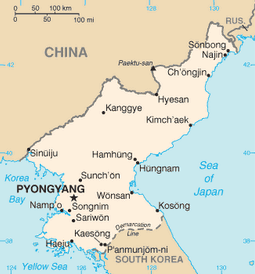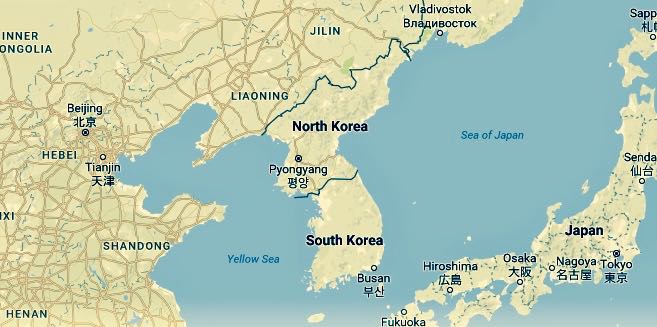 This morning, we learned that North Korean leader, Kim Jong-il, has died–perhaps as much as two days ago. That’s the difficulty about information coming from countries under totalitarian rule–the “facts” are whatever is decided upon by those in power. North Korea, especially, is known for being secretive and even paranoid about the free flow of information on either side of their borders.
This morning, we learned that North Korean leader, Kim Jong-il, has died–perhaps as much as two days ago. That’s the difficulty about information coming from countries under totalitarian rule–the “facts” are whatever is decided upon by those in power. North Korea, especially, is known for being secretive and even paranoid about the free flow of information on either side of their borders.
When it comes to radio, North Korea is certainly one of the most informationally-isolated places on our planet. Hence, governments around the world spend a good deal of resources aiming broadcasts at those who live in North Korea. The hope is that in a country where the average citizen doesn’t even know what the internet is, information via radio broadcasts will penetrate the borders, allowing those within the country to hear outside voices, outside opinions, and enjoy (however briefly) the breath of freedom. That’s what I love about radio, specifically the shortwave variety; it has very little regard for national borders and, unlike the internet, listeners can’t be readily traced or tracked–or punished. This is a common theme at the SWLing Post.
 Of course, radio information flows both ways, so the Voice of Korea sends its own message to the rest of the world. VOK is–to say the least–an oddity in the international broadcasting community. Its propaganda is pure, its bias is obvious and determined, but it does allow outside listeners to read between the lines, thus getting a glimpse into the rigid, restrictive culture of this state.
Of course, radio information flows both ways, so the Voice of Korea sends its own message to the rest of the world. VOK is–to say the least–an oddity in the international broadcasting community. Its propaganda is pure, its bias is obvious and determined, but it does allow outside listeners to read between the lines, thus getting a glimpse into the rigid, restrictive culture of this state.
So, over the coming days, I challenge you to find Voice of Korea on the radio dial (see frequencies below) and listen to their biased perspective on history in the making. As I’ve suggested, sometimes you learn more about what’s really going on by listening between the rosy lines. For example, today even the VoK website makes no mention of their leader’s death (see this morning’s screen capture); that fact, alone, tells you something about how this event has disrupted their flow of information.
This is what I’ve always loved about shortwave radio and international broadcasting–you can listen to different perspectives, and draw conclusions yourself. It’s your own interpretation of events, thus you’re not entirely reliant upon news media for your views and ideas. Unfortunately, this is becoming a lost art here in the modern world, where people generally find it easier to subscribe to one media outlet and often develop blind faith in the sound bites they receive–a form of self-subscribed propaganda.
So that you can form your own opinions, we’ve provided the Voice of Korea’s full B11 schedule (courtesy of PCJ Media) below. See if you can catch this most interesting (and elusive) DX. Listen carefully…

VOK Pennant (Courtesy of Wikimedia Commons)
Voice of Korea B11 Schedule (via PCJ Media)
0100 GMT (10am local) to North East Asia on 7220kHz, 9345kHz and 9730kHz
0100 GMT (10am local) to Central and South America on 11735kHz and 15180kHz
0200 GMT (11am local) to Southeast Asia on 13650kHz and 15100kHz
0300 GMT (12pm local) to North East Asia on 7220kHz, 9345kHz and 9730kHz
1000 GMT (7pm local) to Central and South America on 11710kHz and 15180kHz
1000 GMT (7pm local) to Southeast Asia on 11735kHz and 13650kHz
1300 GMT (10pm local) to Europe on 13760kHz and 15245kHz
1300 GMT (10pm local) to North America on 9335kHz and 11710kHz
1500 GMT (12am local) to Europe on 13760kHz and 15245kHz
1500 GMT (12am local) to North America on 9335kHz and 11710kHz
1600 GMT (1am local) to Near and Middle East, North Africa on 9990kHz and 11545kHz
1800 GMT (3am local) to Europe on 13760kHz and 15245kHz
1900 GMT (4am local) to Southern Africa on 7210kHz and 11910 kHz
1900 GMT (4am local) to Near and Middle East, North Africa on 9975kHz and 11535kHz
2100 GMT (6am local) to Europe on 13760kHz and 15245kHz
If you do not succeed in finding Voice of Korea on the air, check out this website which contains hours of recorded VOK broadcasts.




